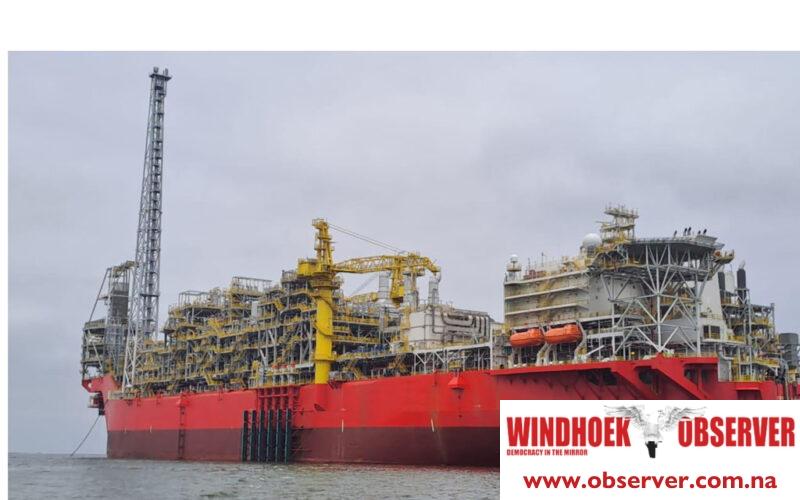Niël Terblanché
Namibia’s main port, Walvis Bay is temporarily playing host to the specially converted oil and gas production ship, FPSO Léopold Sédar Senghor, that on Monday dropped anchor in the bay on its way to Senegal.
The confirmation of the FPSO’s anchorage in Walvis Bay came from Taná Pesat, the Manager of Corporate Communication at the Namibian Ports Authority (Namport).
According to Pesat the colossal vessel will stay at anchor for roughly seven days while it takes on fuel before departing and sailing up the west coast of Africa.
The port of Walvis Bay along with Port Louis in Mauritius have emerged as preferred refuelling destinations for ships looking to avoid the security challenges in the Red Sea.
In response to the escalating security threats in the Red Sea, commercial shipping lines are rerouting the journeys of their vessels through African ports.
These decisions have created a surge in demand for fuel bunkering services.
This vessel, which was previously a very large crude carrier (VLCC), has been converted by MODEC, Inc. into a state-of-the-art Floating Production Storage and Offloading (FPSO) facility, tailored for its new role in the Sangomar Field.
MODEC, Inc. announced that the FPSO Léopold Sédar Senghor departed Singapore on 22 December 2023, embarking on its journey towards Senegal.
The vessel is slated to be deployed approximately 100 kilometres south of Dakar as part of Senegal’s ambitious offshore oil development project.
The conversion of the VLCC into an FPSO has been an intricate and demanding project in terms of both technical expertise and execution complexity.
Despite facing the challenges brought on by the COVID-19 pandemic, MODEC remained fully committed to safety and quality throughout the entire process, with no lost time injuries (LTI) reported.
The successful completion of this project can be attributed to the exceptional teamwork among all stakeholders, highlighting the dedication and hard work invested by everyone involved.
The FPSO Léopold Sédar Senghor is equipped to process and store oil and gas products at sea before offloading them to tankers or pumping them through pipelines to onshore storage facilities.
Its impressive capabilities include the processing of 100,000 barrels of crude oil per day, 145,000 barrels of water injection per day, and a minimum storage capacity of 1,300,000 barrels of crude oil.
This vessel marks MODEC’s fifth FPSO delivery to West Africa, reflecting the company’s 30 years of operational experience in the region.
Presently, MODEC operates two FPSOs in Ghana and Côte d’Ivoire, further solidifying its commitment to the West African oil and gas industry.
The FPSO Léopold Sédar Senghor sails under the flag of the Bahamas and boasts impressive dimensions, measuring approximately 332 metres in length and 58 metres at its widest point.
The vessel is accompanied by the ALP Sweeper, an Anchor Handling Vessel, which was built in 2017 and sails under the flag of the Netherlands.
The ALP Sweeper has a carrying capacity of 4,186 dry-weight tonnes and is 88.51 metres in length, with a beam of 21.65 metres.




